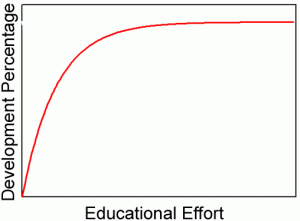Genetics, Race and IQ
Brink Lindsey has an great article discussing race, genetics and IQ. It's hard to excerpt, but here is a bit of it:
A study of twins by psychologist Eric Turkheimer and colleagues that similarly tracked parents' education, occupation, and income yielded especially striking results. Specifically, they found that the "heritability" of IQ - the degree to which IQ variations can be explained by genes - varies dramatically by socioeconomic class. Heritability among high-SES (socioeconomic status) kids was 0.72; in other words, genetic factors accounted for 72 percent of the variations in IQ, while shared environment accounted for only 15 percent. For low-SES kids, on the other hand, the relative influence of genes and environment was inverted: Estimated heritability was only 0.10, while shared environment explained 58 percent of IQ variations.
Turkheimer's findings make perfect sense once you recognize that IQ scores reflect some varying combination of differences in native ability and differences in opportunities. Among rich kids, good opportunities for developing the relevant cognitive skills are plentiful, so IQ differences are driven primarily by genetic factors. For less advantaged kids, though, test scores say more about the environmental deficits they face than they do about native ability.
I have been struggling to articulate my issues with IQ for a long time. I have always been frustrated with the nature vs. nurture arguments on intelligence, because I have always thought the answer is both. But Brink's article get's me thinking along the lines of this simple model:

In this model, intelligence is not a product that works straight out of the box, so to speak. It's an engine with some inherent potential that requires a lot of fine-tuning and a long break-in period to reach that potential. Let's say in the US suburbs our kids have a development percentage of 0.9 (we have to leave room for future Flynn Effect -- it would be awesome if it turned out we were only at 0.5). I assume education is an exponential rise to a limit, where early gains are easy but incremental gains at the margin are harder and harder to achieve.

If this is the case, then US suburban kids are probably pretty tightly clustered around that 0.9 (say from 0.88 to 0.92). This cluster seems tight but again remember in an exponential rise to a limit, the effort and expense to take a kid from 0.88 to 0.92 might be very very large**. In this situation, measured IQ is going to be driven mainly by genetics, with a wide bell curve in native intelligence dwarfing the effect of a much tighter bell curve around development. Small improvements in educational development in this model both come at a high price and have little effect on measured IQ.
In a different sort of society, say in rural Mexico, kids might be much lower on the development scale, say around 0.6, due to cultural factors, educational opportunities, even diet. In this case, large changes can occur in measured intelligence even from small changes in education (the steep part of the curve) and difference in education and development might be at least as important as the genetic contribution.
** Postscript: Some may object that differences in education seem to be much larger than these in US schools, but we have to make sure we are talking about the same output. Here we are solely talking about the ability to improve IQ as measured by IQ tests. There are many other things education does than just polish native intelligence and cognitive ability. It teaches skills. For example, it teaches one to write. I would agree that there are huge differences in schools in their ability to produce kids that can write good 5-paragraph essays, or complete a calculus problem, or understand how to analyze a historical document.